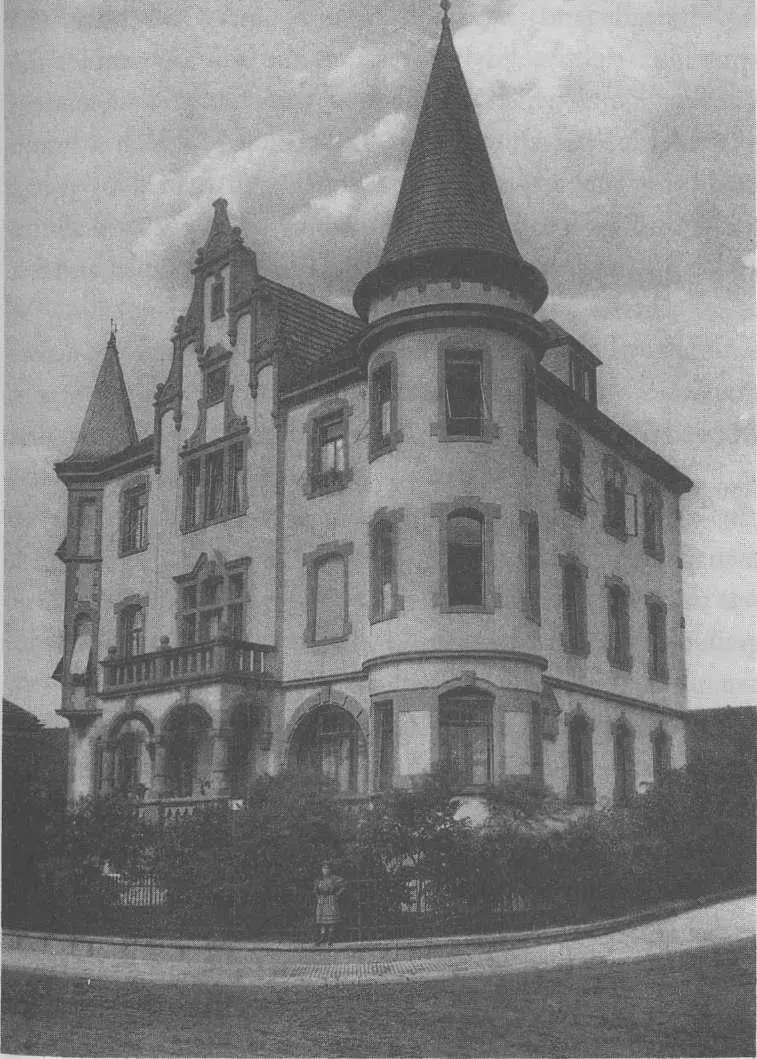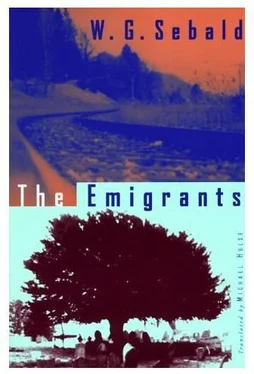If I think back nowadays to our childhood in Steinach (Luisa's memoirs continue at another point), it often seems as if it had been open-ended in time, in every direction — indeed, as if it were still going on, right into these lines I am now writing. But in reality, as I know only too well, childhood ended in January 1905 when the house and fields at Steinach were auctioned off and we moved into a new three-storey house in Kissingen, on the corner of Bibrastrasse and Ehrhardstrasse. Father had bought it one day, without hesitation, from Kiesel the builder, for a price of 66,000 gold marks, a sum which struck us all as the stuff of myth, and most of which he had raised on a mortgage with a Frankfurt bank, a fact which it took Mama a long time to accept. The
Lazarus Lanzberg stables had been doing better and better in recent years, supplying as far afield as the Rhineland, Brandenburg and Holstein, buying everywhere, and leaving all their customers well pleased and satisfied. The contract Papa had won as supplier and provisioner to the army, which he proudly mentioned whenever he had the chance, had doubtless been the decisive factor in giving up farming, moving from backwater Steinach, and finally establishing a position in middle-class life. At that time I was almost sixteen, and believed that a completely new world, even lovelier than that of childhood, would be revealed to me in Kissingen. In some respects that was really how it was, but in others the Kissingen years up until my marriage in 19 21 seem in retrospect to have marked the first step on a path that grew narrower day by day and led inevitably to the point I have now arrived at. I find it difficult to think back to my youth in Kissingen. It is as if the gradual dawn of what was called the serious side of life, the minor and major disappointments that soon began to mount up, had affected my ability to take things in. And so there is a good deal I can no longer picture. Even of our arrival in Kissingen I have only fragmentary memories. I know it was bitterly cold, there was endless work to be done, my fingers were frozen, for days the house refused to warm up despite the fact that I poked the coals in the Irish stoves in all the rooms; the hoya plant had not survived the move; and the cats had run away, back to the old home, and, though Papa went back especially to Steinach, they were nowhere to be found. To me the house, which the people of Kissingen soon took to calling the Lanzberg Villa, always remained essentially a strange place. The vast, echoing stairwell; the linoleum flooring in the hall; the corridor at the
back where the telephone hung over the laundry basket and you had to hold the heavy receivers to your ears with both hands; the pale, hissing gaslight; the sombre Flemish furniture
f

with its carved columns — there was something distinctly creepy about all of it, and at times I feel quite definitely that it did steady and irreparable harm to me. Only once, if I remember rightly, did I ever sit on the window seat in the drawing room, which was painted with foliage and tendrils like a festive bower, and from the ceiling of which a brand new brass Sabbath-lamp hung down, also fuelled by gas; I leafed through a page or two of the blue velvet postcard album which had its place on the shelf of the smoking table, and felt like a visitor, passing through. Often in the mornings or evenings, when I looked out of my top floor window across the flower beds of the spa nursery gardens to the green, wooded hills all around, I felt like a maid. From the very first spring we rented out several rooms in the house. Mother, who ran the household, was an exacting teacher of domestic management. At six o'clock, right after I got up, my first task was to give the white chickens in the garden their measure of grain and fetch in the eggs. Then breakfast had to be made, the rooms tidied, the vegetables trimmed, and lunch cooked. In the afternoons, for a while, I did a course in shorthand and book-keeping that was taught by nuns. Frau Ignatia was very proud of me. At other times I took the children of visitors to the spa for walks in the public gardens — for instance, Herr Weintraub's fat little boy. Herr Weintraub was a timber merchant and came every year from Perm in Siberia, because Jews (so he said) were not allowed at watering places in Russia. From about four o'clock I would sit out in the chalet darning or crocheting, and in the evening there was the vegetable patch to be watered, with water from the well — the tap water cost too much, claimed Papa. I could go to evening concerts only if Leo was home from the grammar school.
Usually his friend Armand Wittelsbach, who later became an antiques dealer in Paris, would collect us after dinner. I would wear a white dress and stroll through the park between Armand and Leo. On occasions the spa gardens were illuminated: there would be Chinese lanterns strung across the avenues, shedding colourful, magical light. The fountains in front of the Regent's building would jet silver and gold alternately. But at ten o'clock the spell broke and we had to be home. Part of the way, Armand would walk on his hands beside me. I also remember a birthday outing with Armand and Leo. We set out at five in the morning, first towards Klausenhof and from there through the beech woods, where we picked big bunches of lily of the valley, back to Kissingen. We had been invited to breakfast with the Wittelsbachs. It was about that time, too, that we looked out for Halley's comet at night, and once there was a total eclipse of the sun in the early afternoon. It was dreadful to see the shadow of the moon slowly blotting out the sun, the leaves of the rambling rose on the balcony (where we stood with our soot-darkened pieces of glass) seeming to wither, and the birds flapping about in a frightened panic. And I recall that it was on the day after that Laura Mandel and her father first visited us from Trieste. Herr Mandel was nearly eighty but Laura was just our own age, and both of them made the greatest imaginable impression on me, Herr Mandel on account of his elegant appearance — he wore the most stylish linen suits and broad-brimmed straw hats — and Laura (who only ever called her father Giorgio), because of her firm, freckled forehead and her wonderful eyes, which were often rather misty. During the day, Herr Mandel would usually sit somewhere that was partly in the shade — by the silver poplar in our garden, on a bench in Luitpold Park, or on the terrace of the Wittelsbacher Hof hotel — reading the papers, making occasional notes, and often simply lost in thought. Laura said he had long been busy projecting an empire in which nothing ever happened, for he detested nothing more than enterprises, developments, great events, changes, or incidents of any kind. For her part, Laura was all for revolution. I once went to the theatre in Kissingen with her when some Viennese operetta — I no longer know if it was the Zigeunerbaron or Rastlbinder — was being performed to mark the Austrian Emperor Franz Josef's birthday. First the orchestra played the Austrian national anthem. Everyone stood up except Laura, who remained demonstratively seated because — coming from Trieste — she could not stand Austrians. What she said concerning this was the first political thought I ever came across in my life, and how often have I not wished, of late, that Laura were here again to discuss things with me. For several years she stayed with us during the summer months, the last time being that especially lovely season when both of us turned twenty-one, myself on the 17th of May and she on the 7th of July. I remember her birthday particularly. We had taken the little steamer upriver to the salt-vapour frames, and were strolling about in the cool salty air near the timber scaffold down which the mineral water continuously flows. I was wearing my new black straw hat with the green ribbon which I had bought at Tauber's in Wurzburg, where Leo was now reading classics. It was a beautiful day, and as we were walking along the paths a huge shadow suddenly fell upon us. We looked up at the sky, at the same time as all the other summer guests out walking by the frames, and there was a gigantic zeppelin gliding soundlessly through the blue air, apparently only just clearing the tops of the trees. Everyone was amazed, and a young man standing nearby took that as an excuse to talk to us — taking his courage in both hands, as he later admitted to me. His name, he told us right away, was Fritz Waldhof, and he played the French horn in the spa orchestra, which consisted chiefly of members of the Wiener Konzertverein who took jobs at Kissingen during the summer break every year. Fritz, for whom I had an instant liking, saw us home that afternoon, and the following week we went on our first outing together. Again it was a glorious summer day. I walked ahead with Fritz, and Laura, who had distinct doubts about him, followed with a Hamburg cellist named Hansen. Needless to say, I no longer remember what we talked about. But I do remember that the fields on either side of the path were full of flowers and that I was happy, and oddly enough I also recall that, not far out of town, just where the sign to Bodenlaube is, we overtook two very refined Russian gentlemen, one of whom (who looked particularly majestic) was speaking seriously to a boy of about ten who had been chasing butterflies and had lagged so far behind that they had had to wait for him. This warning can't have had much effect, though, because whenever we happened to look back we saw the boy running about the meadows with upraised net, exactly as before. Hansen later claimed that he had recognized the elder of the two distinguished Russian gentlemen as Muromzev, the president of the first Russian parliament, who was then staying in Kissingen.
Читать дальше













